One of the most alluring things about the Morocco High Atlas Mountains is their proximity to Marrakech. Within 80 kilometres (50 miles) of the ancient city, the drive to the Berber village of Imlil from where you can pick up a guide, mule and muleteer to take you into the mountains, takes just one and a half hours, which means enthusiastic amateurs are just as likely to book a trek as seasoned hikers.
Guided treks are available for anything from one to eight days and can be tailored to meet individual requirements depending on whether you want to add Africa’s highest mountain, Toubkal (4,167 metres), to your tally of peaks climbed or simply to witness the beauty of the valleys.
But whatever your personal goals or hiking experience, here are a few essential pieces of advice to help you get over the peaks and troughs of trekking in the High Atlas Mountains of Morocco.
Pre-book your guide. The muleteer is usually responsible for travelling ahead and preparing your lunch on the trail, and in the mountain refuge or camp it’s your guide and muleteer who will cook your evening meal. Pre-booking your trek allows your guide to stock up on essential ingredients, hire a mule and muleteer he knows and trusts, and be ready to hit the trail with you as soon as you arrive.
Costly returns. The cheapest way to get from Marrakech to Imlil is by Grand Taxi where a seat will cost you between 50Dh and 75Dh (£4/$6 – £6/$9 ) depending on how many people are sharing and how long you’re willing to wait for all the seats to be taken. But a much larger portion of the 300Dh (£23/$35) cost of the return journey may be yours if there are no other hikers at Imlil to go back with you. Make sure you have the cash, taxi drivers don’t take plastic.
Double up. Although you’ll be accompanied by mules to carry the bulk of supplies, the muleteer will often take a different route from hikers or move at a different pace so you’ll not be able to reach a hand into the saddle bag whenever you need the sun block. Pack all your overnight requirements in one bag which the mule will take and keep essentials with you in a lighter rucksack for carrying.
Keep an oily nose. Unless you intend visiting the High Atlas Mountains in the depths of winter, you will find the mountain trails to be extremely dusty and rhinitis sufferers will find their condition going into overdrive. Applying Vaseline to the nostrils before you begin trekking each day and renewing it regularly will help to cut down some of the discomfort but you’ll still need a good supply of tissues to hand.
Be a water carrier. The dry atmosphere at altitude keeps throats parched and as your mule is likely to be out of sight or reach for much of the trail, it’s essential that you carry water with you. There are fresh streams and springs to refill bottles and you should never miss an opportunity to do so as it may be a while before you reach water again.
Be prepared. Mountain lodges such as Tigmi Tacchedirt provide very basic accommodation with communal bathrooms, and ‘essentials’ can quickly disappear when a group of trekkers arrive. Having your own toilet roll ensures that you are never short of the basics. Keep a roll in your rucksack on the trail too, you never know when Nature may call.
Bedtime story. The High Atlas Mountains are not known for their lively night life. Once dinner has been cleared away and the following day’s itinerary and start time agreed, there is little to do other than chat to fellow hikers. Bed time tends to be an early affair and if you’re not used to lights out by 9.30pm, a good book and a small torch will be your best friends.
Soften the night. Sleeping arrangements in mountain lodges in Berber villages will often consist of a mattress on a concrete floor in a very basic room or a dormitory. Pillows can be the wrong side of concrete hard and of indeterminate cleanliness. Having your own inflatable pillow should ensure a good night’s sleep without a bruised ear.
Soundproof. Berber villages traditionally have domestic dogs whose job it is to provide an early warning system against goat attacks by wild dogs. Not immune to false alarms at regular nightly intervals, ear plugs will not only blot out the volume but also reduce the vivid Hound of the Baskervilles nightmares.
Keep it small. Tipping is an essential part of Moroccan culture. Having a good supply of small notes and coins will ensure you get an extra blanket if the night’s cold, fresh mint tea when you arrive at a lodge after a day’s trekking and hot water for a shower.
Info bar:
Treks begin from around 560Dh (£43/$65) per person per day including guide, mule, muleteer, all meals and accommodation.
There are many tour companies and lodges who arrange guides and treks in the High Atlas Mountains including Journey Beyond Travel, Tourdust and High Atlas Lodges.
I pre-booked my guide Ibrahim and muleteer Hamid through Saharatouring.
Andrea (Andy) Montgomery is a freelance travel writer and co-owner of Buzz Trips and The Real Tenerife series of travel websites. Published in The Telegraph, The Independent, Wexas Traveller, Thomas Cook Travel Magazine, EasyJet Traveller Magazine, you can read her latest content on Google+

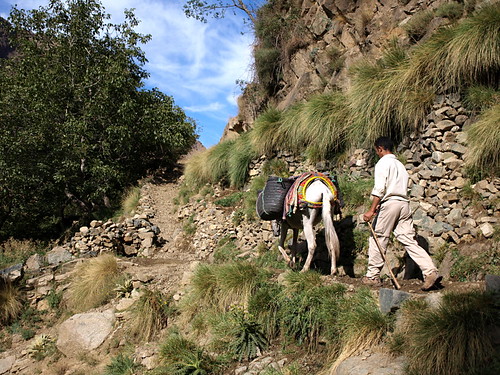
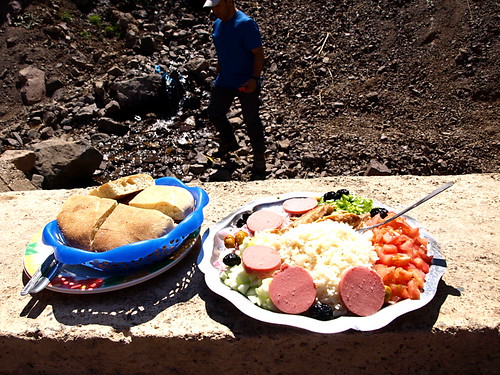
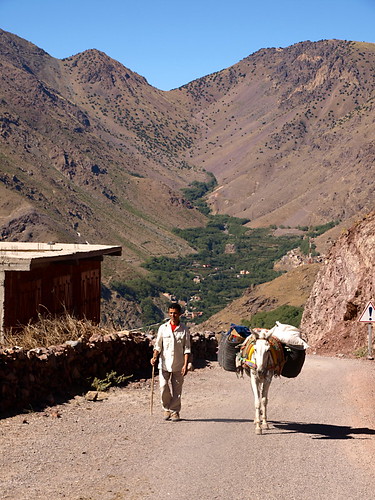
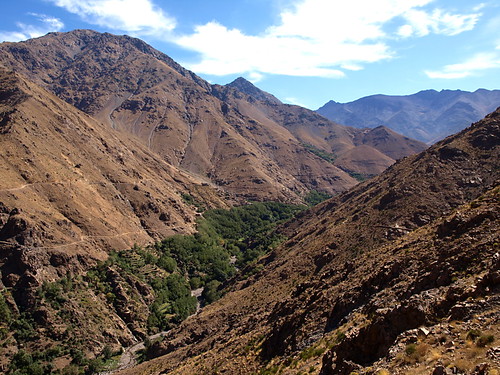
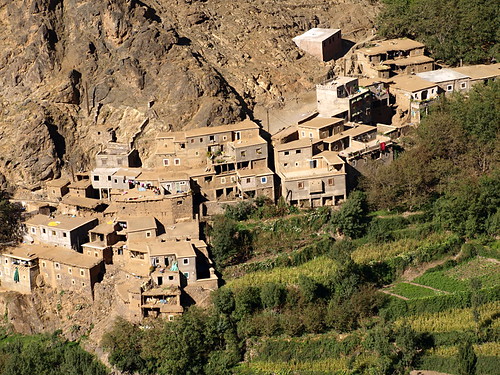




Nice photo of the Tizi n’Tacheddirt!
Easy to moderate. Boots recommended. You need to be reasonably confident of your fitness. You should bring a sleeping bag;
Atlas Mountains Guide is a trekking company based on the principles of sustainability that aims to promote eco-friendly and socially responsible tourism.
Photo
Welcome to Atlas Mountains Guide.
Atlas Mountains Guide is a team of experienced and well–qualified staff. Each of us has
worked in the tourist trade for over 7 years and is very knowledgeable about the itineraries
of the tours that we lead. We are Berbers, so we can explain best about our culture,
traditions and way of life, making the whole trekking experience unique and authentic.
We also have strong relationships and networks throughout the High Atlas Mountains
area, as well as the Sahara desert, the coastline and the imperial cities. We are immensely
experienced in organizing tailormade trekking options successfully.
We warmly invite you to enjoy the Moroccan mountains in our company and share our
Berber experience and our culture.